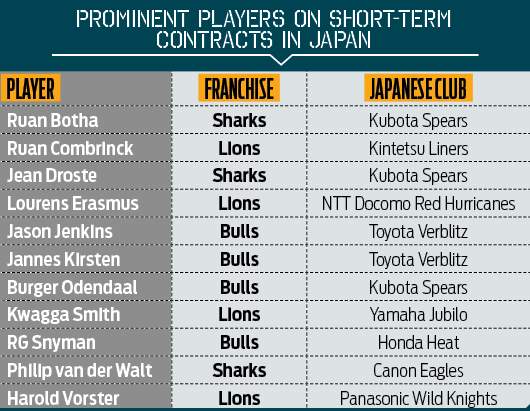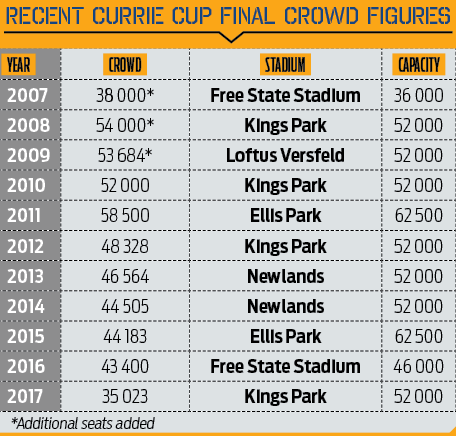The Currie Cup may never regain its prestige in a professional rugby landscape, writes MARIETTE ADAMS.
While there is widespread concern about the Currie Cup’s future, opinion is divided as to whether ‘South Africa’s premier domestic tournament’ can – or even should – be restored to its former glory.
Joel Stransky, who won the Currie Cup with Natal at Loftus in 1990, says it’s time to face the fact that the competition is no longer ‘absolutely everything’, as it was at the start of his career.
‘Bear in mind that South Africa was isolated, so we didn’t play internationally and there was no Super Rugby,’ explains the former Springbok flyhalf. ‘The Currie Cup has an incredibly proud history, but time and life moves on. We must accept the Currie Cup now has a different place in our tournament structure.’
The Currie Cup was once considered the holy grail of South African rugby, with the likes of Frik du Preez, Mannetjies Roux, Naas Botha, Morné du Plessis, Uli Schmidt, Stransky himself and the late Joost van der Westhuizen – to name a few – writing themselves into rugby folklore.
In the 1969 final, Du Preez scored a try and kicked drop-kick and place-kick penalties for his beloved Northern Transvaal against Western Province. Teammate Mof Myburgh famously summed it up afterwards, saying, ‘Ou Frik het ge-drop, ge-place en ge-score.’
A year later, Roux’s Griqualand West caused the biggest upset in Currie Cup history when they beat Northern Transvaal to claim the last of their three titles.
The Currie Cup also gave us two memorable Du Plessis vs Botha moments. In the 1977 semi-final in Pretoria, Du Plessis had to be escorted off the field after a massive tackle on Botha that drew the ire of the Loftus faithful. In the 1979 final at Newlands, Botha nailed two drop goals to give his side a 15-15 draw against WP, prompting the infamous ‘it’s like kissing your sister’ analogy from Du Plessis.
More recently, there was Sharks flyhalf Pat Lambie’s dismissive hand-off on WP flank Schalk Burger in the 2010 final.
Since then, though, the Currie Cup has become a developmental tournament used to prepare youngsters for Super Rugby. The top Springboks no longer play in the domestic competition, with only fringe Boks given game time when required.
A significant group of players also opt to play club rugby in Japan during the Currie Cup, before returning to their franchises for Super Rugby.
The Currie Cup format has changed regularly too. While the nine-team tournament in 2016 also had a single round of league matches, this year’s single-round, seven-team format reduced it to just 10 weeks, including the semi-finals and final. The jury may still be out for some on whether it will help to revive or ruin the Currie Cup, but WP coach John Dobson gave his verdict before the tournament had even begun.
‘The single-round competition is part of the ongoing issues hammering nails into the coffin of the Currie Cup,’ he said. ‘For the four years I have been in charge and the year before that, there have been five different formats. It’s hard for a competition to maintain integrity like that.’
Sharks assistant coach Braam van Straaten agrees, while he also believes the Currie Cup suffers from an absence of big-name players.
‘Depending on the draw, playing a single round is favourable to one side and harsh on another. We need to have a fair competition that gives every team the best opportunity to make the semi-finals.
‘The Currie Cup was a global phenomenon because the Springboks and all other top players were part it,’ he adds. ‘We live in tough economic times and it’s difficult for the unions to attract fans to games and raise revenue without the pull of their star players.’
Pumas coach Jimmy Stonehouse says his union and Griquas have suffered more financially from the abbreviated format than the Super Rugby or Pro14 anchor unions.
‘It’s had a negative effect on our ticket sales and sponsorship deals. From a business point of view, it’s imperative that double rounds are reintroduced. One positive thing from a rugby perspective is that smaller provinces don’t have the squad depth of those with franchise status, so a shortened campaign helps us in terms of injuries and player management.’
Stonehouse believes the Currie Cup will always be a big event, but admits its brand has taken a battering.
‘People want to watch the best players and commercial partners prefer to sponsor the best teams. Having so many big-name players in Japan, France and England as well as the Cheetahs and Kings’ A teams in the Pro14, has an effect on the quality and standard of the on-field competition as well as the Currie Cup’s financial durability in the long term.’
Rob Louw, a former WP flank and five-time Currie Cup champion, doesn’t pause for thought when asked if the tournament’s best years are behind it and who the responsible parties are.
‘It’s a crying shame that a sacrosanct tournament like the Currie Cup has been watered down to a basic-level competition,’ he says. ‘Few people take it seriously any more. The money-grabbing administrators most certainly do not; they are too busy dancing to the tune of broadcasters and commercial partners.’
Fans have spoken with their feet. Crowds during the league stage of the tournament have been poor for years and even the final now has thousands of empty seats.
Consider that the Currie Cup deciders at Loftus in 2009 and at Kings Park in 2010 were attended by 53,684 and 52,000 fans respectively. In 2017, only 35,023 people attended the final in Durban.
Stransky says in a perfect world, matches across all competitions involving South African teams would be sold out and the fact that is no longer the case says more about rugby than a single tournament.
‘We have to be aware it’s not just the Currie Cup that is struggling with crowd attendances. There was a small crowd at the recent Test between the Springboks and Argentina in Durban. In Super Rugby, including the quarter-final and semi-final at Ellis Park, the stadiums had more empty seats than filled ones. That is because rugby in general has issues getting people down to the grounds.’
Stransky and Louw believe SA Rugby should encourage Currie Cup games to be played at club and school venues instead of virtually empty big stadiums.
‘It’s now a lesser competition and it would be a fantastic thing to take the game to the people as opposed to expecting the people to come to the game,’ Stransky explains.
‘Our appreciation of club rugby is almost non-existent,’ says Louw. ‘If Currie Cup games are played at club and school grounds, it might help put it back on the map.’
Van Straaten says Currie Cup unions need to get the community involved and provide a better match-day experience for fans.
‘We have to start thinking out of the box and make the live experience at grounds special. Rugby has always been a family game, but the product has become stale.’
Unfortunately, though, it doesn’t look like improving any time soon.
– This article first appeared in the October 2018 issue of SA Rugby magazine.







